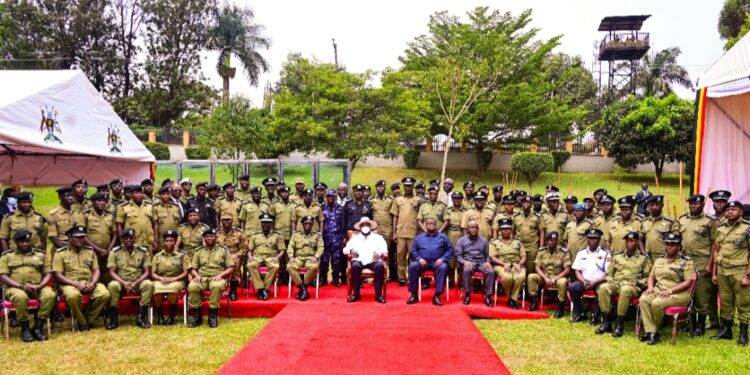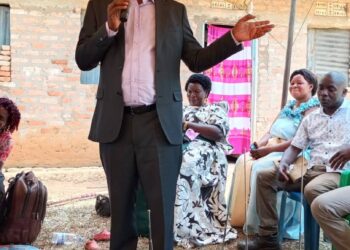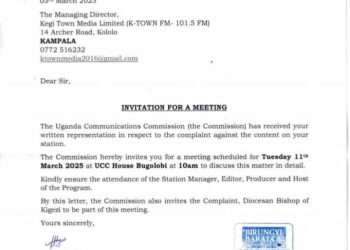President Yoweri Kaguta Museveni has called on Uganda’s security agencies to prioritize stability and national security over immediate welfare concerns, emphasizing the importance of ideological clarity and strategic planning.
He made the call today during the opening session of the 28th Police Council Meeting at the Police Headquarters in Naguru, Kampala.
The meeting was held under the theme : “Strengthening Police Capacity to Address Contemporary Policing Challenges for a Safe and Secure Community”.
The Police Council, which is the top policy-making organ of the force, is composed of 85 members, including the Inspector General of Police (IGP), Deputy IGP, heads of specialized units, regional police commanders, and representatives of various ranks.
It is mandated Under Section 10(1) of the Police Act, to oversee key aspects such as recruitment, training, promotions, procurement, and police welfare , policy formulation, welfare of officers and Disciplinary matters.
President Museveni highlighted the challenges many African countries face in maintaining security, attributing their struggles to unrealistic planning.
“Many African countries have failed because they plan as if they have unlimited resources. Security agencies; the army, police, intelligence services, and prisons must provide security within the available means. That is where others fail. They expect to have everything in place before securing their countries,” he said.
The President recounted Uganda’s own experience, citing the early days of the National Resistance Army (NRA), which operated for 17 years without salaries.
“When we started our struggle in 1971 under FRONASA, we were volunteers. We had to save our country first and forget about salaries. That is why we were able to liberate Uganda. If we had insisted on pay, we would have been stuck,” President Museveni said.
The President acknowledged the support Uganda received from leaders like Mwalimu Julius Nyerere of Tanzania and Samora Machel of Mozambique.
“Nyerere gave us a place to train. Samora Machel did the same. Between 1976 and 1978, I trained a group of 28 fighters. By the time Amin’s regime collapsed, we had built an army of 9,000, mostly armed by Tanzania. We later returned all the guns,” he noted.
He also emphasized that Uganda’s success came from prioritizing security and stabilization before focusing on salaries and welfare.
“Even in Somalia, we have been there for 17 years. If we tied the army’s existence to salaries, we would not have lasted. The plan was to first stabilize the country, and then, once stability was achieved, generate the money needed for welfare,”he added.
The President further reiterated the NRM’s ideological stance against tribalism and sectarianism, stressing that Uganda’s prosperity depends on national unity.
“Some people talk about tribes, but they don’t realize they are enemies of their own groups. For example, the Banyankole, who are cattle keepers, need Uganda to sell their milk and beef. Without Uganda, they would struggle. That’s why NRM promotes national unity over tribal and religious divisions,” he explained.
President Museveni also highlighted the importance of regional and international markets, noting that economic integration is crucial for growth.
“By 1870, Germany was not a single country, it had 39 independent states. Italy only united in 1860. When capitalism grew, they realized that without integration, their economies couldn’t expand. That is why Uganda needs regional and global markets,” he said.
On the other hand, President Museveni urged the police and army to adopt cost-effective strategies for welfare improvements, particularly in housing.
“The police and army should build their own institutional houses instead of relying on contractors, who inflate costs. If security personnel live in barracks, it saves money and improves coordination,” he advised.
He also emphasized the need for self-sustaining initiatives within security institutions.
“The police can set up health centers to reduce medical costs and explore education options for their children within army schools. The spouses of police officers should also engage in income-generating activities within barracks to support their families,” he suggested.
Additionally, President Museveni encouraged security agencies to embrace modern technology for efficiency.
“In developed countries, officers don’t stand on roads; they sit in command centers monitoring surveillance cameras. These are force multipliers that enhance policing. With forensic analysis, canine units, and CCTV, we can provide effective security within our means,” he said.
Reflecting on Uganda’s military evolution, the President noted that the UPDF was built with minimal resources.
“For 54 years, we either had no pay or low pay, but we built a powerful army. That is why I insisted on prioritizing scientists when I am sick, I need a doctor, not a Shakespeare scholar. We must first support those who save lives and stabilize the country, then address other needs,” he said.
On his part , the Minister for Internal Affairs, Maj Gen. Kahinda Otafiire cautioned security forces against abusing their authority, emphasizing that no one is above the law and that the right to take life must be exercised with utmost restraint.
“Nobody is above the law,” Gen. Otafiire stated, condemning past instances where some security officers misused their positions to oppress the public instead of protecting them.
“They were supposed to protect the public, but instead, they ended up shielding wrongdoers. If you had a dispute over land, certain individuals would use their ranks to intimidate you. If you had a beautiful wife, they would go to extreme lengths even resorting to violence to take her. If you owned a nice car, you risked losing your life for it,” he revealed.
The minister assured the public that such impunity within the police force is no longer tolerated.
“I have agreed with the Inspector General of Police that this kind of thinking has stopped in the force,” he said.
He further stressed the sanctity of human life, reminding officers that even the President, who has the authority to sign a death warrant, does so only after receiving counsel from the Prerogative of Mercy Committee.
“The right to take away life is very sacrosanct. Even the President is advised before making such a decision. Life should never be taken cheaply because once you do, you cannot reverse it if you were wrong,” he warned.
The IGP Abas Byakagaba welcomed the President to the Police Council meeting, highlighting key achievements, ongoing reforms, and challenges facing the Uganda Police Force.
The IGP noted that since the last time the President met with the Police Council meeting in November 2019, significant efforts have been made to strengthen the force’s capacity in combating crime, deploying modern policing technologies, and improving officers’ welfare.
“In line with Your Excellency’s guidance, we have expanded our presence to ensure a quicker response to crime. We have deployed 13 police regions covering 79 districts and 279 sub-counties to bring services closer to the people and enhance security,” he stated.
“Our strategic priorities include ensuring security during the forthcoming elections, improving crime detection and response, enhancing officers’ professionalism and welfare including housing, career development, and health and strengthening community policing,” the IGP added.
Mr. Byakagaba further revealed plans to expand anti-crime infrastructure, strengthen ICT capabilities, and improve logistics and firearms management.
“We are prioritizing the improvement of the CCTV surveillance system to ensure its full functionality in crime detection and prevention. Additionally, we plan to recruit 12,000 professional police constables in the 2024/25 financial year to enhance security across the country,” the IGP stated.
However, he expressed optimism that with continued government support, these issues would be addressed despite the challenges, including manpower shortages and funding gaps.
The IGP also commended the strong collaboration between the Uganda Police Force and other security agencies, including the UPDF and intelligence services, in maintaining law and order.
“Our crime report for the last year indicates a 4.1% reduction in crime, a testament to our joint efforts in securing the country. I also take this opportunity to appreciate our line minister for the leadership and support that has enabled us to focus on our priorities,” he said.
IGP Byakagaba further lauded the government for enhancing police officers’ salaries in the current financial year, a move he said would boost morale and professionalism within the force.
In attendance was also the Permanent Secretary of Internal Affairs , Lt. Gen. Joseph Musanyufu and the members of the Police Council.
Do you have a story in your community or an opinion to share with us: Email us at editorial@watchdoguganda.com













